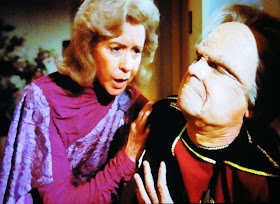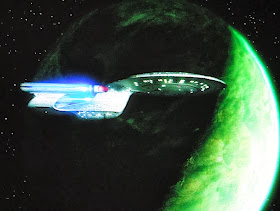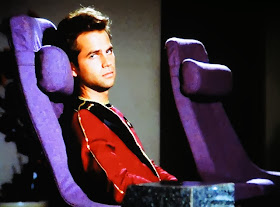"The quest for youth Number One - so futile.
Age and wisdom have their graces too."
-Captain Jean-Luc Picard-

It comes with the territory of a TV-sized budget that every now and again effects and/or production, make-up, etc. are subject to receive some degree of criticism in retrospect as a series surely ages. How fitting Star Trek: The Next Generation, Season One, Episode 16, Too Short A Season, should apply a theme involving the aging process.







Too Short A Season, even upon release, was indicted by some critics and fans for its make-up application to guest performer Clayton Rohner in the role of an aged Admiral Mark Jameson (the first Starfleet admiral to appear on ST:TNG). Jameson is lured into a crisis via the Enterprise-D and Captain Jean-Luc Picard to handle a terrorist/hostage negotiation orchestrated by Karnas who specifically requests Jameson be involved.
ST:TNG's sojourn into aging as plot mechanism has been a staple of science fiction. Nothing new there, but it's always in the delivery, the interpretation and the hopefully refreshing new twists. Sadly, Too Short A Season fails on that latter front.



There is of course the natural aging process, the unnatural aging forward process and the unnatural aging backwards process. Too Short A Season poses a scenario involving the latter. Such a scenario would one day resonate powerfully for director David Fincher's The Curious Case Of Benjamin Button (2008), a true delight of a film, based on the short story of the same name by author F. Scott Fitzgerald published in 1922.


Star Trek: The Original Series employed its own use of make-up accordingly for The Deadly Years, which also plotted an aging-themed entry within the annals of classic Trek. ST:TOS certainly provided its fair share of inspiration for the inaugural first season of ST:TNG and its writers - without question.

Personally, my issues have absolutely nothing to do with the make-up (more on that in a moment) and everything to do with the rather unconvincing, over-the-top portrayal of Jameson by Rohner. Rohner really hams up the aged angle and is less than believable in the spot. He moves far too quickly as an elder and his facial jarring back and forth is simply overdone and over the top. Critic Zack Handlen noted Rohner acted "like a Muppet when he's supposed to be elderly and weak." Handlen also noted his youthful angst later in the episode. Rohner transforms his youth into that of a spoilt and irrational child. It's simply too much to believe.


As far as the make-up goes, I don't really find fault with the production team on the matter at all. It's no less credible that Space:1999's Black Sun or ST:TOS' The Deadly Years and those entries are wonderful. Seeing Too Short A Season today and I found the make-up still looks as good as one might expect. Despite the fact everyone seems to tow the party line on the make-up as "sub-par" according to Larry Nemecek in The Star Trek: The Next Generation Companion, this is far superior to most programming. To be picking on the make-up production seems to be missing the point of poor scripting and poor performance. Funny enough, Kathryn Powers married writer Michael Michaelian. Powers wrote the less than stellar Code Of Honor earlier in the season and Stargate SG-1 Emancipation. Gosh, I've been awfully tough on these writers. But even D.C. Fontana couldn't rectify the problems with this one. A story device centered on an embraceable admiral regressing backwards in age to its logical conclusion of that process (the anti-Alpha Child of Space:1999) would have been far more interesting than the distracting plot threads that muck up the works here. Truth be told, and to my surprise, Fontana tightened up the terror trap thread and it was Michaelian's original intent to see the man regress to age fourteen and lose memory of his wife. Now, that's a story I would sign up for (wink).
There is a great use of lighting by director Rob Bowman.


With regard to the make-up though, honestly, there is something about Star Trek's approach to make-up that walks the line of being entirely sound and grounded in reality but also gives the appearance of something otherworldly and fantastical as integrated so successfully on a series like The Twilight Zone (1959-1964). Take the Japanese for example, they are exceptional at embracing these fantasy aspects in their cinema and television, but Americans (except those that have embraced the fantasy work of Toho) have always found it difficult to suspend disbelief unless it is so perfect it can manage to somehow trick the mind. But, like ST:TOS, this ST:TNG work is wonderful and there is something magical about the production team's input that work wonders on these series. If audiences in general want their television and cinema to be realistic, I find it fascinating they are all so awfully forgiving of the CGI monstrosities that grace the silver screen even today. I'll happily accept the work provided on a series like ST:TNG and its predecessors any day. It's not even a close call between the make-up here or computer applied effects (unless painstakingly applied with care and precision - for example in the case of The Curious Case Of Benjamin Button). Why people (director Bowman was a critic too) make such a fuss of these things is boggling. There is nothing to be ashamed of here and certainly carries the same kind of weight and magic found in Star Trek's The Menagerie. Go figure. Michael Westmore and Werner Keppler were the make-up team and also applied the same make-up work to DeForest Kelly in Season One opener Encounter At Far Point.


As far as the story, Jameson suffers from Iverson's disease which effects the body. Like Christopher Pike in The Menagerie, Jameson has been confined to a support chair for four years, but is apparently getting stronger and looking younger with each passing day since arriving on the Enterprise-D. And unfortunately there is no known cure for Iverson's disease.


Picard discovers from Jameson that a negotiation for Cerebus III earned him access to an alien rejuvenation process by drug. Jameson received the process and it is working but not without complications.
En route to Mordan IV it is revealed that it is Karnas that holds the hostages. It is also clear that Karnas seeks revenge on Jameson thus the reason for his summoning.


It was a subspace transmission that requested Picard essentially deliver Jameson. But Jameson, too, is eager to engage Karnas and using his status as Admiral has all but assured that he will have full control of the Away Team for this mission.
The truth is inevitably revealed that Jameson violated the Prime Directive years prior providing arms to Karnas, as well as his rivals, plunging a planet into four decades of ruinous civil war. "I started it. I lit the match." Jameson also falsified Federation documents. Jameson is indeed a troubled, haunted man.



It seems undeniable that ST:TNG was indeed channelling current events of the day. ST:TOS often incorporated analysis and reflection in its own series particularly when looking at The Vietnam War (1955-1975), whilst here Too Short A Season (1988) appears to be incontrovertibly holding the mirror up to the Iran-Contra Affair (1985-1987) and the events surrounding the arms for hostages negotiations that became a scandal for the Ronald Reagan administration involving Oliver North and others. This is indubitably a reflection of those events and perhaps a further questioning of the symbolic nature of the Prime Directive through our own American foreign policy of which we currently have none.

When Jameson beams down with the Away Team, Picard is highly concerned and joins him. Picard's concern is for his crew. Worf, Geordi La Forge, Data and Tasha Yar beam down with Jameson and Picard. Once again Picard, the Captain of the ship is beamed into a highly volatile and hostile situation where his life is very much on the line. Captain James T. Kirk often led the charge and realists have often criticized this variable of Star Trek. But if everything was played precisely by the book we wouldn't have much of a science fiction drama now would we?
A very dicey situation forces a quick return for the team. And away the away team goes back to the ship.



Ultimately Too Short A Season fails to shore up in the logic department. Troubled, guilt-ridden man or not, why would Jameson be so hell bent on returning to this ill-fated disaster? The character certainly doesn't seem like a man with the weight of years of torment on his shoulders, but that could be the fault of Rohner in the role. Additionally, the alien rejuvenation process as the reason for the aging process is mildly interesting if a bit random and implausible here. So Jameson discovers the fountain of youth and the first thing he wants to do is risk life and limb in a hostage negotiation. Does he have no loyalty to his wife? What about those golden years and perhaps enjoying the freedom of youth again? But Jameson yearns for atonement even if Rohner doesn't sell this in the character. Too Short A Season is long on leaps of suspension and simply didn't entirely work for me. This is an overly silly or uninteresting story compounded by weak guest performances. The principals here are fine, but actually are relegated to a supporting cast for this one. The two male guests aren't substantial enough to sell a weak story. Rohner and Michael Pataki as Karnas (Pataki appeared as Klingon Korax in ST:TOS, S2, Ep15, The Trouble With Tribbles) are simply way too over dramatic in their performances.



Director Rob Bowman succinctly told Starlog Magazine that Too Short A Season was long on dialogue. "That was a heavy-duty dialogue show, even by Star Trek standards. It seemed like all that the people did in the script I read was sit around and talk. It was a killer because a show like this runs the immediate risk of being boring. This was a tough episode for a couple of reasons. It wasn't really a Star Trek episode in the sense that it was about one of the regular characters. It was more how they reacted to the other entity. The trick was to keep the regular characters motivated through a largely abstract storyline and thus keep the audience from switching channels." (Starlog Magazine #136, p.24). Once again, Bowman's remarks illustrate the problem with the focus on Rohner in the role. With all of the groaning about lack of character development during the first season by a largely ensemble cast here is a whole episode lost to guest appearances. Denise Crosby, Gates McFadden and others would have relished the opportunity for something a little more substantial. After all any season of television is too short.



And if Too Short A Season seems to have all of the wrong rhythms that echo the first half of ST:TNG, it should come as no surprise to learn that it was actually production Episode 12 in the season order even though it was aired as Episode 16. In other words this one came before The Big Goodbye and after Justice, Hide And Q, The Last Outpost and The Battle just to name a few relative lemons.
Sadly Too Short A Season does little to help the cause of the some times laborious, at times seemingly long Season One. On a personal note, and I think you'll agree, one thing is true when it comes to aging it is far too short a season indeed. This much we know.
Too Short A Season: D+.
Writer: Michael Michaelian, D.C. Fontana.
Director: Rob Bowman.




Patrick Stewart: Am I actually playing second fiddle to this fellow. I'm a trained thespian. By God, get rid of this man and make it so!

You are right on the money with this one. I never had a problem with the make up on this episode, but the performance and the overall script were the real issues. It just drags and never does anything interesting or unexpected.
ReplyDeleteI did you like your linking of this story to Iran Contra. I didn't catch that the first couple times I've watched this one. Well spotted.
Roman,
ReplyDeleteThanks for writing. Sometimes I feel I may be spending just a bit too much of my time on something that probably doesn't deserve it. Nevertheless, I am enjoying the ST:TNG run.
Cheers pal
I haven't seen this particular episode though I purchased season one. I guess that's why some say that season is hit or miss. You know I didn't care for the season opener with Q either.
ReplyDeleteOddly when you were writing about the aging process I am reminded of the recent Debbie Boone commercial where she pitches the reverse aging process thing. I'm not sure how they do that, but I don't believe it. I think what they did was take photos of the actors, then age them in photoshop to create picture of how they might look like aged. It's weird.